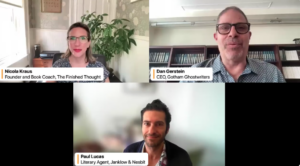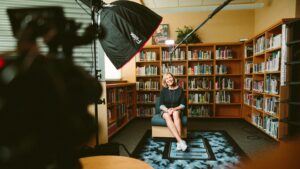The ghosts in our network ask a lot of great questions about how to advance their careers, but one of the most frequently asked is a variation on, “how do you find an agent?”
Lucinda Halpern has answers. Halpern is a literary agent with over 15 years of experience and has secured book deals with Penguin Random House, Simon & Schuster, HarperCollins, Hachette, and Macmillan. She represents a range of New York Times and internationally bestselling authors in the categories of personal growth, popular science, narrative nonfiction, memoir, and upmarket fiction. Her classes and coaching programs have been taught to hundreds of writers worldwide.
This month, she published her first book — Get Signed: Find an Agent, Land a Book Deal, and Become a Published Author — and answered our questions about some of the FAQs our writers have about securing an agent.
Can you tell us a little about your journey to becoming a literary agent? What attracted you to this work?
Long before I became a literary agent, I wanted to be a writer. Leaving my home and family behind in New York at 22, I rented a sofa in my friend’s Parisian garret apartment. I walked along the perimeter of the Seine and drank espressos by day. By night, I wrote poetry and journaled hopeful memoirs. But six months later, my dream to publish a book had not materialized (just yet!), and I returned to Manhattan to take a position with HarperCollins as a book publicity assistant.
In my daily work, I communicated with various media outlets—newspaper and magazine editors, radio and television producers—and coordinated book tours. I found that I not only related to the ever-querying minds, ambitions, and insecurities of the authors with whom I worked, but I also loved to fight for them. I learned that books don’t simply sell themselves and that having the right partner is invaluable. I fantasized about what it would be like to sculpt and promote a book on its rise to stardom before the world knew its name. And that’s when I learned about the role of a literary agent, a position that united a passion for craft and communication with an appetite for business.
At what point in a writer’s process should they start reaching out to agents?
The answer really varies, which is why this is such a rich question to explore. For novelists, I tell our agents at Lucinda Literary that I would want something 85% publishable. (Yes, that specific!) What I mean by that is a first chapter that hooks us, characters we can root ourselves in and remember long after the read, a tightly woven plot full of surprises or rich takeaways—something you can envision scene by scene on the screen. Every novel should feel cinematic. Agents are reading with the film in mind (aren’t we all)?
It’s expected that, as agents, we will edit and improve your work as part of our partnership. But in such a competitive market for debut novelists, it’s highly beneficial to get an outside edit (or several) before taking your shot with agents.
For nonfiction, it’s a different calculus. The most important metrics are the idea and the platform (which is analyzed in surprisingly different ways in Get Signed). Unless it’s narrative nonfiction by an established writer or journalist (and even then…), it’s an exception and not the rule that an expert in his or her field would also possess writing talent at quite the same level or at the level the market requires. Over the course of my career, I’ve signed writers on the basis of a Ted Talk, an article in a notable publication, a blog, and a one-paragraph email. I can spot a big idea quickly, and if the person pitching it is the best person to speak to that idea—speak, not necessarily write—I’m hooked.
What’s some of the most misinformed guidance out there about query letters?
A common example is that agents don’t care about “you,” they care about the book. That’s so diminishing, in my opinion. I fall in love with authors before I fall in love with their books. A sense of their writing and sensibility should emanate from the page and not get lost in a stilted, formal presentation. When writers confine themselves by trying so desperately to conform to an agent’s rules, they can lose the very power and humanity that might endear them to an agent.
But the most defeating misconception actually comes from within writers themselves, not any community of “experts.” It’s the instinct that if someone doesn’t request your work, it’s not any good. That’s incorrect for a few reasons:
1) Don’t assume your query letter has been read. It’s possible the agent never received it; an intern or a SPAM filter did, and fate simply wasn’t on your side at that particular moment and your query didn’t get the look it deserved. A simple “confirming this email arrived” about a month after you’ve sent a query can ensure it was received in the first place. There are other more sophisticated tactics that are revealed in Get Signed.
2) It’s even more possible that your pitch simply didn’t convey your book’s promise in a way in which an agent could really see its potential. I always say that if you don’t get a response on your pitch, it’s a problem with your letter. If you do get a request for your work and then radio silence, it could be an issue with your material.
What are the most common and easily avoidable errors first-time writers make in pitching their work to agents?
Many writers are nervous about categorizing their work, so they avoid classifying their work within a given genre. Your book may sit within a few categories (hopefully not too many!), but if a writer isn’t clear on their genre, it’s leaving me guesswork [to determine the genre that] I may not have time to do.
Many writers also don’t mention “comps” (recent books that bear similarities to theirs). When I receive a blind pitch, one of the first things I look for is what the comps are—that signals to me whether this particular title will be within my realm of interest (most important) or those of my publishing relationships (also important).
The writer who shows sophistication in identifying a specific genre alongside comps eschews the mark of the amateur. In my new book Get Signed, I identify the “Data-Collector”—the writer who really does their research, knows the landscape, and can prove it in a pitch—as one of the 4 Types of Writers Who Get Book Deals.
How much do your credentials matter as a writer?
Certain credentials make a difference. Agents, editors, and readers (think of these roles as integrated, all looking for the same thing, making the same equation as we assess acquiring a book) will immediately spot credentials such as an MFA from a prestigious university, mentorship from a well-regarded author in the genre, connections to other acclaimed writers, or awards. Having a website so you can actually curate what agents and editors see of you and your content is one of the easiest hacks I recommend for new writers who are querying, and an online audience of any kind helps, but for fiction, it’s all about the read; it’s all about what’s on the page.
Is anyone taking on first-time authors anymore?
Despite the bad rap, every agent and editor I spoke with in my interviews for Get Signed still takes on first-time authors and gets excited by promising new talent. Most authors I sign are about a decade into their careers. They’ve done enough time that they command trust and authority with an audience, but their star is still rising; there’s still a career ahead—maybe the biggest one they’ve had yet. THAT’s the moment a first time writer is ripe for a book deal.
I was also just over a decade into my career as an agent, just about to turn 40 years old and enter, as one does, my mid-life crisis, when I got a book deal for Get Signed. And wow, I thought that was just the best; the perfect way to enter the next decade. Truthfully, I didn’t have the wisdom or experience to be eligible for a book deal sooner.
On that note, why did you decide to write this book?
Books change lives. It’s right on our website at Lucinda Literary. It’s the kind of thing agents say to writers all the time—until they’ve experienced it themselves. Since GET SIGNED’s recent publication, my company has transformed because my vision and message has sharpened. How? Because the events and coaching I give has allowed me to hear from hundreds of writers, to drill in on their pain points with precision, to determine what I can uniquely solve and answer for them (and it’s so much more than the answer to how to “get signed”). Disguised as a book about querying, GET SIGNED is really about how to build the foundation for a book you can be proud of. And then to be confident and advocate for it, as the best agent would.
There are so many strategies I’ve absorbed from over 15 years of representing authors, first to the media and then to publishers. GET SIGNED is my attempt to pay it forward.
Learn more at lucindaliterary.com or download Lucinda’s free author training. Follow Lucinda Halpern on Instagram and Twitter.



